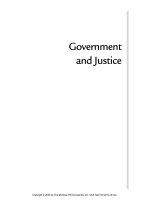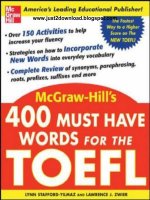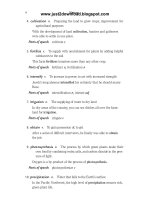Tài liệu 400 must have words for the toefl part 4 pptx
Bạn đang xem bản rút gọn của tài liệu. Xem và tải ngay bản đầy đủ của tài liệu tại đây (613.99 KB, 10 trang )
The mountains form a physical barrier between the west and the
east.
Usage tips
Physical usually comes before the noun it describes.
Parts of speech
physically
adv
9.
process n.
A series of steps leading to a result
To get a good job, most people go through a long process of letter-
writing and interviews.
Usage tips
Process is often followed by of plus the -ing form of a
verb.
Parts of speech
proceed
v,
process
v
10.
survive v.
To continue living (despite some danger or illness)
After getting lost in the mountains, Gordon survived by eating wild
plants and catching fish.
Usage tips
Survive is often followed by a phrase with by.
Parts of speech
survivor
n,
survival
n
TOEFL Prep I
Find the word or phrase that is closest in meaning
to the opposite of each word in the left-hand column. Write the let-
ter in the blank.
1. physical (a) not an integral part
2. migration (b) stay the same
3. adapt (c) die
4. inherent (d) staying in one place
5. survive (e) mental
TOEFL Prep II
Choose the word from the list that is closest in
meaning to the underlined part of each sentence. Write it in the
blank.
14
Nature
www.just2download.blogspot.com
diverse evolved generation process survive
_______________
1.
Various languages are spoken on the Indian subconti-
nent.
_______________
2.
Making bread involves a sequence of steps that takes
about three hours.
_______________
3.
Few sea turtles manage to live through their first year
of life.
_______________
4.
This age group tends to support current educational
policies.
_______________
5.
Her thinking about economics has changed slowly in
the last several months.
TOEFL Success
Read the passage to review the vocabulary you
have learned. Answer the questions that follow.
The migration from Asia to North America across the Bering Strait
(perhaps by land bridge) was a monumental
event in human history.The
process of overspreading the Americas took more than 1,000 years, or 30
generations.This might seem to confirm common sense—that slow travel
was inherent in any great migration without wheeled
vehicles across unknown terrain. Further thought shows
that this process was remarkably fast—about 10 north-
south miles per year, on average. The Americas were
populated at an astounding pace, when one considers
the physical limits of the human body and the physical
features of the American continents. Legs of humans can move only so
fast under the best of circumstances, and they work even slower over
mountain passes or deserts. Populations spread through the diverse
regions of the Americas (grasslands, eastern forests, coastal swamps) and
needed to adapt to their new environments. The migrants’ lifestyle had
evolved over the years to that of professional nomads ensuring that they
would find the resources needed to survive.
Evolution and Migration
15
Bonus Structure—
Further thought
means “looking
deeper; thinking
more.”
www.just2download.blogspot.com
1.
Which sentence best expresses the essential information in this
passage?
a.
Human migration across the Bering Strait was remarkably slow.
b.
Physical limitations made migration across the Bering Strait almost
impossible.
c.
Humans readily adapted to life in the Bering Strait.
d.
The migration through the Americas was surprisingly fast.
2.
In this passage, the word monumental is closest in meaning to
a.
disastrous
b.
evolving
c.
important
d.
physical
Lesson 3
Evolution and Migration
TOEFL Prep I
1.
e
2.
d
3.
b
4.
a
5.
c
TOEFL Prep II
1.
diverse
2.
process
3.
survive
4.
generation
5.
evolved
TOEFL Success
1.
a
2.
c
16
Nature
www.just2download.blogspot.com
LESSON
Petroleum Alternatives
Target Words
1.
constraint
6.
emission
2.
contamination
7.
extinction
3.
deplete
8.
reservoir
4.
dispose of
9.
shrink
5.
elementally
10.
stable
Definitions and Samples
1.
constraint n.
Something that restricts thought or action
The constraints of military life kept Eileen from seeing Private Mor-
ris more than once a month.
Parts of speech
constrain
v
2.
contamination n.
Being made less clean by a germ or hazardous sub-
stance
The contamination in the river came from the factory located just
upstream.
Parts of speech
contaminate
v,
contaminant
n
3.
deplete v.
To greatly decrease the supply of a resource or material
The prolonged war depleted the country’s national treasury.
Parts of speech
depletion
n
4
Copyright © 2005 by The McGraw-Hill Companies, Inc. Click here for terms of use.
www.just2download.blogspot.com
4.
dispose of v.
To throw away; to get rid of; to kill
She disposed of her unwanted possessions before moving.
The tyrant cruelly disposed of all his enemies.
Usage tips
Dispose of should be learned as a unit. In this meaning,
dispose does not occur without of.
Parts of speech
disposal
n,
disposable
adj
5.
elementally adv.
In terms of elements; basically
Elementally, coal and diamonds are the same.
Parts of speech
element
n,
elemental
adj
6.
emission n.
Sending out from a small space into the general environ-
ment; a substance discharged into the air
The Environmental Protection Agency regulates the emission of
pollutants into the air.
Usage tips
Emission is usually followed by an of phrase.
Parts of speech
emit
v
7.
extinction n.
Complete disappearance; the end of existence
Human beings have caused the extinction of many other species.
Usage tips
Extinction implies an absolute end; an extinct thing
cannot be brought back into existence.
Parts of speech
extinct
adj
8.
reservoir n.
A place where a liquid is collected and stored
Cult members threatened to poison the town’s water reservoir.
Parts of speech
reserve
v
9.
shrink v.
To become reduced in size, amount, or value
If you dry your clothing on the “high heat” setting, they may shrink.
Parts of speech
shrinkage
n,
shrinkable
adj
18
Nature
www.just2download.blogspot.com









